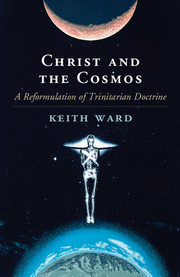Book contents
- Frontmatter
- Contents
- Preface
- Acknowledgements
- PART I THE THREEFOLD NATURE OF THE DIVINE BEING
- PART II THE BIBLICAL SOURCES OF TRINITARIAN THOUGHT
- PART III THE TRINITY, IMMANENT AND ECONOMIC
- 11 Why Three?
- 12 The Trinity and Revelation
- 13 Hegel and Modern Theology
- 14 The Immanent Trinity
- 15 The Identity of the Immanent and the Economic Trinity
- 16 Hegel Again
- 17 What Creation Adds to the Trinity
- 18 The Epistemic Priority of the Economic Trinity
- 19 The Trinity and Naive Realism
- 20 The Trinity and the Cosmos
- 21 Revelation and the Immanent Trinity
- PART IV THE SOCIAL TRINITY
- PART V THE COSMIC TRINITY
- Bibliography
- Subject Index
- Name Index
12 - The Trinity and Revelation
from PART III - THE TRINITY, IMMANENT AND ECONOMIC
Published online by Cambridge University Press: 05 September 2015
- Frontmatter
- Contents
- Preface
- Acknowledgements
- PART I THE THREEFOLD NATURE OF THE DIVINE BEING
- PART II THE BIBLICAL SOURCES OF TRINITARIAN THOUGHT
- PART III THE TRINITY, IMMANENT AND ECONOMIC
- 11 Why Three?
- 12 The Trinity and Revelation
- 13 Hegel and Modern Theology
- 14 The Immanent Trinity
- 15 The Identity of the Immanent and the Economic Trinity
- 16 Hegel Again
- 17 What Creation Adds to the Trinity
- 18 The Epistemic Priority of the Economic Trinity
- 19 The Trinity and Naive Realism
- 20 The Trinity and the Cosmos
- 21 Revelation and the Immanent Trinity
- PART IV THE SOCIAL TRINITY
- PART V THE COSMIC TRINITY
- Bibliography
- Subject Index
- Name Index
Summary
It would be absurd to write a book on modern discussions of the Trinity without referring to the writings of Karl Barth. He has been largely responsible for a revived interest in the doctrine of the Trinity in recent theology. He is one of the chief defenders of a one-consciousness or non-social view of the Trinity – though, as I shall argue, his defence is in the end rather ambiguous. As I have mentioned, he saw that the word ‘person’ can be misleading for modern readers and proposed the phrase ‘mode of being’ for what were traditionally called the three ‘persons’ in God. He also made the idea of the Trinity central for Christian faith in a new way by arguing that the very idea of Christian revelation depends on the concept of the Trinity. Thus we cannot, he thought, first develop a concept of revelation and only later develop a doctrine of the Trinity. What we think Christian revelation is already implies the centrality of the Trinity for Christian faith.
In the Church Dogmatics (1, 1), Barth argues that the very idea of revelation – he means ‘Christian revelation’ – already implies a threefoldness. There is the revealer, the one who reveals; there is the act of revealing; and there is the reception of the revelation by a person – what Barth calls ‘revealedness’ – without which no revelation would have occurred. All three, he thinks, are in some sense identical. I believe he is right in this, though he seems to draw some implications from it which are not well founded and which could be positively misleading.
There are, of course, many alleged religious revelations in the world, of which Christianity is only one. All would agree, I think, that there needs to be a revealer, and most would agree that this is God. There has to be an ‘act of revealing’, but at this point many divergences arise. The act of revealing may, as in most Islamic interpretations, be performed by an angel and consist of the recitation of words which a prophet remembers or writes. In orthodox Hindu traditions, too, revelation primarily consists in the words of the Veda and Upanishads, held to have been virtually dictated, or at least inspired by, a god to seers.
- Type
- Chapter
- Information
- Christ and the CosmosA Reformulation of Trinitarian Doctrine, pp. 92 - 97Publisher: Cambridge University PressPrint publication year: 2015

